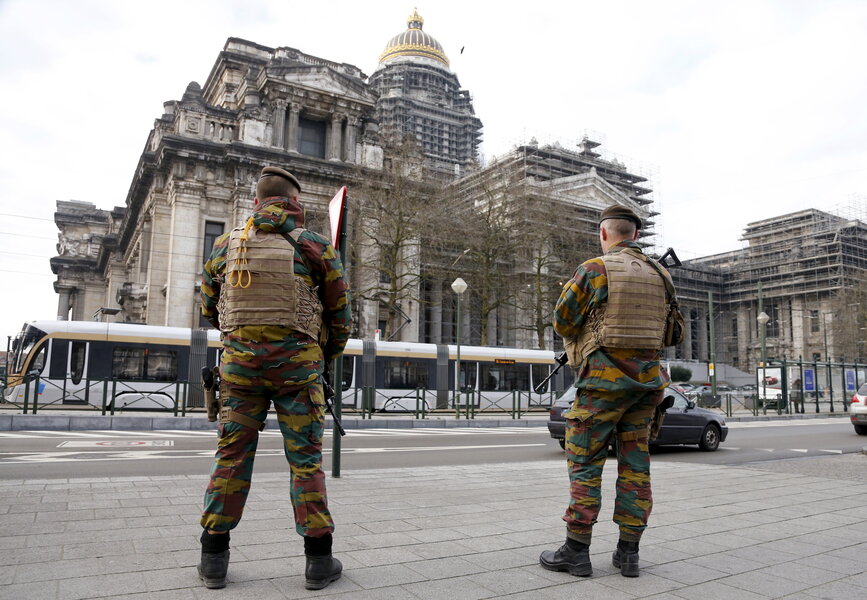Months after Paris attack, new surveillance regime emerges in Europe
Loading...
| BERLIN
The man who allegedly masterminded the Paris terror attacks is at large even though he was questioned by French police a day after the Nov. 13 rampage.
French authorities apprehended and released Salah Abdeslam three times in one day. They freed him because they didn't know Belgian authorities suspected him to be an Islamic State fighter nor that his brother was one of the suicide bombers in the Paris attacks.
In the wake of the tragedy that left 130 dead, European governments bemoaned an intelligence "black hole" stemming from countries failing to share intelligence. Now, lawmakers are considering ways of enhancing surveillance practices and rethinking many privacy safeguards designed to prevent pervasive data tracking and collection across Europe.
"Intelligence agencies are talking now, both because of the panic and, quite frankly, practically because lives are at stake," said Scott Stewart, vice president of tactical analysis at Stratfor, a global intelligence and advisory firm. "Politically we can’t be seen dropping that same ball again."
Before the attacks, only half of the European Union's 28 countries participated in intelligence exchange through Europol, the EU's law enforcement agency, according to press spokesperson Jan Op Gen Oorth. Now all belong, and three are in the process of joining.
In December, the EU adopted measures to retain and share passenger data on inter-European flights with law enforcement agencies, an idea first proposed in 2007. EU officials had discussed a passenger name record system that would allow airlines to collect a passenger's names, itinerary, contact details, as well as payment and baggage information and share it with authorities.
It failed to muster support because of privacy concerns. But in light of the attacks, however, it received an expedited vote from EU interior ministers and was passed 38 to 19 in December.
Intelligence sharing should also stretch beyond Europe, says Mr. Stewart of Stratfor. It was not Belgium, but rather Morocco, that alerted France that the Abdelhamid Abaaoud had passed through a few European borders on his way to France before the attacks in Paris. But by then it was too late.
There are already comprehensive databases filled with relevant information about terrorists worldwide, says Stefan Heumann, program director of the European Digital Agenda Program in Germany’s stiftung neue verantwortung (New Responsibility Foundation). But they need to do a better job of syncing together, he adds.
"I think the problem is not necessarily the information sharing. It’s more one of resources and focus," says Mr. Heumann. "The problem is that the French authorities and other authorities didn’t have intelligence that told them, 'This guy needs to be arrested.' "
Starting in March, two of Europe’s largest databases, the Regional Crime Database and the Schengen Information System, will be connected, Interpol Secretary General Jürgen Stock announced to a counterterrorism forum of more than 50 countries at the Hague in January. Europol also opened a Counter-Terrorism Center in January that includes resources for tracking EU citizens who have become jihadists and their foreign financing.
Yet countries such as France, which has one-third the intelligence personnel as the United Kingdom despite having similar populations, have to do a better job of intelligence gathering on the ground before they can talk about cross-border cooperation, says Eric Denece, director of the French Center for Intelligence Research in Paris.
"The main problem is how to gather intelligence more efficiently for every intelligence agency," says Mr. Denece. "The main problem in France is that we need more people on the ground. We need more people in the suburbs. Then I think it would be more efficient to exchange data with foreign states."
Some have questioned why such terrorist attacks have occurred in France, Spain, and Britain in recent years, but not yet in Germany, which has had difficulties coordinating its domestic intelligence gathering, says Joerg Forbrig, a Central and Eastern Europe expert at the German Marshall Fund in Berlin.
He points to the case of National Socialist Underground, a far-right German terrorist group that operated under the noses of police for nearly 10 years before they were detected in 2011.
"This is the case where I think a country like France is much better coordinated and much more organized," says Mr. Forbrig.
European officials are also pursuing strategies that many politicians and policymakers argue could preclude attacks in the planning stages. One of the most controversial proposals is for governments to have a so-called "master key" that officials could use to unlock encrypted communications, therefore disrupting terrorists’ use of the Internet.
That plan, which is similar to one floated in the US, has been harshly criticized by digital rights and civil liberties groups that say such a master key – or backdoor – for encrypted communications would create more security risks for everyone on the Internet.
Also, not unlike recent proposals stateside, governments in Europe are calling for more cooperation between Internet platforms and social media companies to combat extremism and terrorist recruitment online.
As a result, tech companies are working more closely with Europol's Internet Referral Unit, the outfit tasked with policing the Internet for terrorist activity. That outfit is set to grow in size from 15 to 30 positions in the next 12 months.





